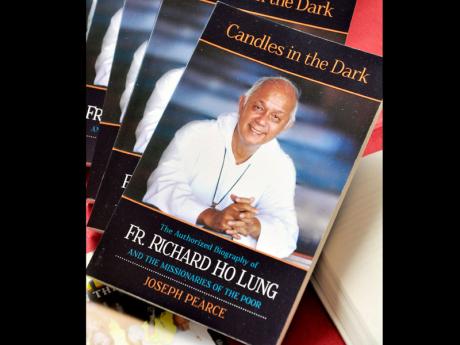From Buddha to Christ (cont'd)
This week, we will continue a series of excerpts from Father Ho Lung's bio, written by Joseph Pearce -'Candles in the Dark' Chapter One.
"As a little boy in the country, we played a lot by the riverside, which was just across the street from where we lived, and played hide and seek, picked mangoes from the trees and romped with our neighbours, but it was a very free life and a very happy life in many ways. Yes, it was carefree although we were poor. We were not conscious of being poor, nor did we worry about it. People were very kind. Everybody shared. Ladies who sold mangoes and sweet substance on the side road would always give us something if
we were hungry. I would pick plums from the trees. Then we also found that people would come to our little store when they were in trouble. We used the word 'trust'. We would allow them to trust a little bit for the oil or the sugar or the fish or whatever they needed."
In spite of such poverty, or perhaps because of it, Father Ho Lung remembers his childhood as a time of halcyon and Arcadian peace, filled with friendly faces and set against a picturesque landscape, Sarah and Nora, "the Jamaican women who cared for us as their own children"; "the gregariousness of Jamaican blacks, the beautiful and lively revival music, the friendliness and spontaneity of those in our poor neighbourhood, the religious nature of our people, and the magnificent presence of the Almighty in the mountains, hills and rivers." All of these memories and experiences of childhood are part of what Father Ho Lung describes as "the soulscape of myself and my family".
Richard attended school in the north Jamaican town of Highgate, St. Mary in these early years, but when he was seven, the family moved to Kingston, Jamaica's capital, so that he and his siblings could get a proper education. His father rented a small grocery store at 42 Old Hope Road, which became their new home.
influenced by Sister
Although he and his siblings were unhappy with the move to the big city, they adjusted well and began their education in earnest. After a year at Camperdown High School, Richard moved to Alvernia preparatory school, where he was deeply influenced by the teachings of Sister Mary Elizabeth and the Franciscan sisters, who taught him about Jesus' love for the poor. He and his family were as poor as they had been in the countryside and he recalls, without embarrassment, that he was sixteen before he first wore underwear. He had only one pair of pants, which he wore until they were utterly tattered. He walked barefoot to school, where he regularly went without lunch. At home, one small cup of rice was often passed around for dinner to be shared by the entire family. "No electricity, lack of food and even water, the pit toilet - none of these created shame or anxiety in our family. There was worry, but the love connection between us overrode our fear," Father Ho Lung recalled.
Richard and his siblings befriended two other Chinese families who were considerably wealthier and lived in a much larger house nearby. The children of the two families played happily together and Richard does not recall that the disparity in wealth caused any problems or friction. Even at Christmas, when he and his siblings received only one present each whereas their friends received many more, he did not recall feelings of envy coming between them. "This revealed from an early age his lack of concern for status," wrote his biographer, Fr Kenneth Payne, "and may well have helped to pave the way for events later in life." Father Ho Lung remembered his mother gathering him and Loretta around the bed to tell them of the family's struggles to make ends meet:
"She said, 'I want you to know and want you to understand that we are poor people, but you know we love you,' and at that time we understood in a very, very deep way what was really the true meaning of life. My father came in and he said, 'You know I want you both to remember one thing, that it doesn't really matter whether you're rich or you're poor. Those things don't matter. And if you're poor and people don't want to be your friend, then they shouldn't be your friend. They're not worthy of it.' And he said to me, 'There are certain values in life that you must not forget, and that is to learn to commit yourself to people for who they are'."
These words of parental wisdom had a liberating effect on the two children. "We didn't care who we were or what we were, the fact that we had a latrine toilet and that we bathed from pans of water rather than having a shower. We were just joyful and glad and happy just the way we were."

